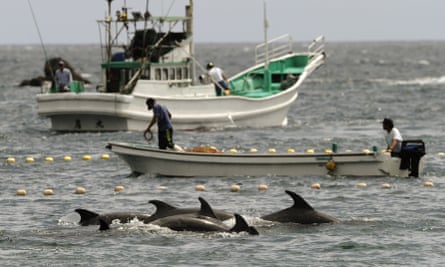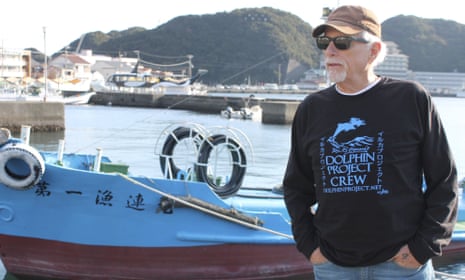A leading US animal rights activist is to be deported from Japan after being accused of trying to enter on a tourist visa to support a campaign against the slaughter of dolphins.
Ric O’Barry, who starred in The Cove, the 2009 Oscar-winning documentary about the annual dolphin cull in the town of Taiji, has been detained at Narita airport near Tokyo since Monday.
His son, Lincoln O’Barry, said immigration authorities had turned down his father’s request to visit Japan using a tourist visa. They reportedly accused him of lying during questioning and of having links to the marine conservation group Sea Shepherd, whose members have a constant presence in Taiji.
The 76-year-old, who trained dolphins for the 1960s TV series Flipper before devoting himself to conservation, reportedly denied the charges, saying he was going to observe dolphins as a tourist.
Taiji, on Japan’s Pacific coast, gained international notoriety as a result of The Cove, which followed O’Barry and other activists as they attempted to document the killing of dolphins by local fishermen. The film, directed by Louie Psihoyos, won the Academy Award for best documentary.
The method used to kill the animals has been widely condemned by environmentalists. The US ambassador to Japan, Caroline Kennedy, has also voiced deep concern about the “drive-hunt” method.
Fishermen pursue pods of dolphins and bang metal poles together beneath the water to confuse their hypersensitive sonar. The dolphins are then driven into a large cove sealed off by nets, and taken to a secluded inlet to be killed with knives and spears.
Last year, aquariums in Japan voted to stop buying live dolphins from Taiji after they were threatened with expulsion from the world’s leading zoo organisation. Taiji’s mayor, Kazutaka Sangen, later said the town would set up a new body that would continue to sell dolphins to aquariums.
O’Barry, who heads the Dolphin Project campaign group, is a regular visitor to Taiji, where fishermen catch hundreds of dolphins during the six-month season, which starts in September. The most attractive specimens, usually bottlenoses, are sold to aquariums and sea parks, while others are killed and their meat sold in local restaurants and supermarkets.
In an email to his son seen by the Associated Press, O’Barry said: “I’m incarcerated, on trumped-up charges. In a world where so much that is wild and free has already been lost to us, we must leave these beautiful dolphins free to swim as they will and must.”

Media reports said O’Barry was resisting deportation and had been transferred to another detention facility near Narita airport. His lawyer Takashi Takano visited him on Friday and said O’Barry was being held alone but was “in good spirits”.
The Japanese government was expected to issue a formal warrant and physically deport him, Takano added.
The deportation order marks a hardening of attitudes among Japanese authorities towards environmental activists in Taiji. Police have increased their presence in the town in case of clashes between Sea Shepherd members and locals, who claim they are being unfairly vilified for maintaining a coastal whaling and dolphin-hunting tradition stretching back centuries.
O’Barry was arrested near the town last September for allegedly failing to carry his passport, but was released the following day.
Takano said immigration officials refused to believe O’Barry’s claim that he was not planning to participate in any campaigns. They cited his presence last August at Japan Dolphins Day in Tokyo, despite having told them he would not attend the event.
Immigration officials said they were unable to comment on individual cases.

Comments (…)
Sign in or create your Guardian account to join the discussion